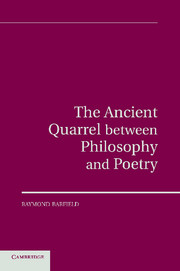Book contents
- Frontmatter
- Contents
- Acknowledgments
- Introduction
- 1 Socrates, Plato, and the Invention of the Ancient Quarrel
- 2 Aristotle, Poetry, and Ethics
- 3 Plotinus, Augustine, and Strange Sweetness
- 4 Boethius, Dionysius, and the Forms
- 5 Thomas and Some Thomists
- 6 Vico's New Science
- 7 Kant and His Students on the Genius of Nature
- 8 Hegel and the Owl of Minerva
- 9 Kierkegaard: A Poet, Alas
- 10 Dilthey: Poetry and the Escape from Metaphysics
- 11 Nietzsche, Heidegger, and the Saving Power of Poetry
- 12 Mikhail Bakhtin and Novelistic Consciousness
- Index
- References
1 - Socrates, Plato, and the Invention of the Ancient Quarrel
Published online by Cambridge University Press: 03 May 2011
- Frontmatter
- Contents
- Acknowledgments
- Introduction
- 1 Socrates, Plato, and the Invention of the Ancient Quarrel
- 2 Aristotle, Poetry, and Ethics
- 3 Plotinus, Augustine, and Strange Sweetness
- 4 Boethius, Dionysius, and the Forms
- 5 Thomas and Some Thomists
- 6 Vico's New Science
- 7 Kant and His Students on the Genius of Nature
- 8 Hegel and the Owl of Minerva
- 9 Kierkegaard: A Poet, Alas
- 10 Dilthey: Poetry and the Escape from Metaphysics
- 11 Nietzsche, Heidegger, and the Saving Power of Poetry
- 12 Mikhail Bakhtin and Novelistic Consciousness
- Index
- References
Summary
The quarrel between poetry and philosophy finds its first footing where most of Western philosophy originates, in the work of Plato, and it still reverberates from the assaults of Socrates on the poets when he exiled them from the Republic and claimed that the supreme music was no longer poetry but rather philosophy. There is a nearly journalistic thrill that comes from noting one further fact: the starting point of wisdom for that titanic human being, Socrates, instigator of the philosophical question, source of a new kind of human self-consciousness and critique, founder of true dialectical challenge to the status quo, and chief propagator of the assault on poetry, is accomplished at the temple of Apollo, god of poetry, when the oracle forgoes favoring of the poets and sophists and pronounces Socrates the wisest of men. Even more worthy of journalistic note is his own admission that the sum of his wisdom is that he knows that he does not know, that he is merely a seeker of wisdom. This admission is the very heart of what is most attractive about his engagement in the quarrel between poetry and philosophy, a quarrel and struggle that has a rich history and that constitutes one of the finest examples of humanity exploring the world through every means available to it, including attention to prophecy, oracular utterance, systematic questioning, and even truth uncovered through the instability of madness.
- Type
- Chapter
- Information
- The Ancient Quarrel Between Philosophy and Poetry , pp. 10 - 31Publisher: Cambridge University PressPrint publication year: 2011

